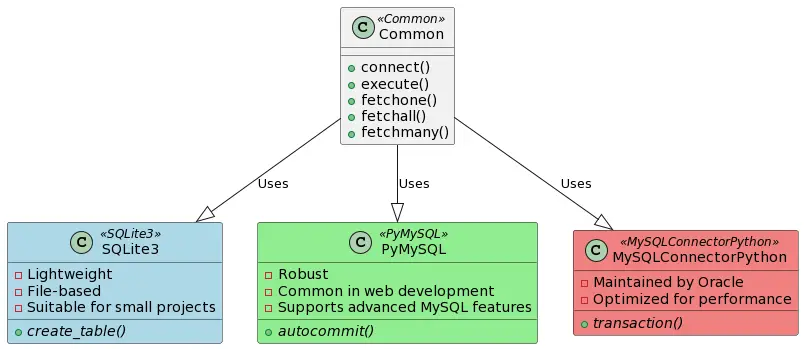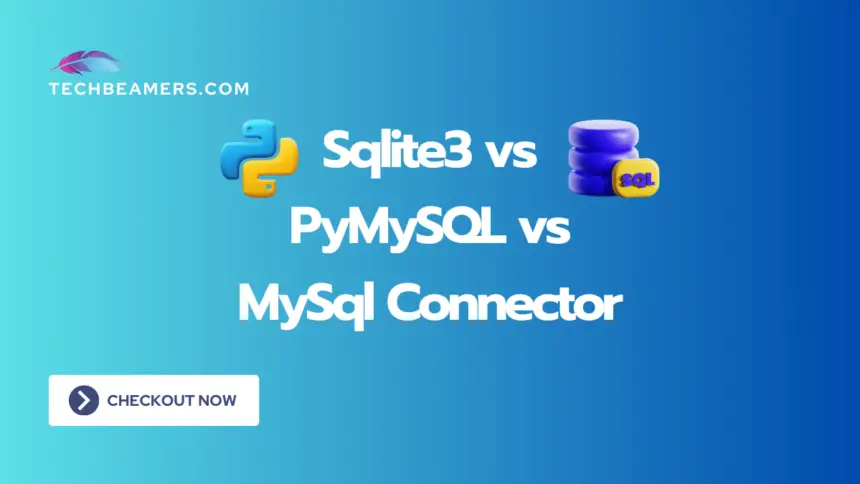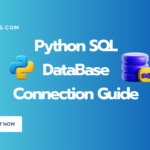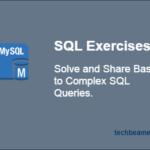Check out this short tutorial to check the difference between the Python SQL libraries that are used in Python to connect to SQL databases. There are mostly 3 such libraries or call them adaptors namely sqlite3, pymysql, and mysql-connector-python.
Introduction to Python SQL Libraries
In the Python ecosystem, SQL libraries play a crucial role in defining how a developer can work with databases. Developers particularly favor SQLite for its simplicity of APIs in lightweight projects. PyMySQL establishes Python connections with MySQL DBMS, and psycopg2 seamlessly integrates with PostgreSQL. These libraries enhance Python’s capability in managing and interacting with data, providing flexibility for developers.

Compare Python SQL Libraries
Let’s compare three popular Python SQL adapters: sqlite3, pymysql, and mysql-connector-python. Each of these is used for interacting with different types of SQL databases.
1. Sqlite3
sqlite3 is a lightweight and built-in Python module for interacting with SQLite databases. It’s perfect for small to medium-sized projects where simplicity and portability are key. Since it comes bundled with Python, there’s no need for additional installations. It’s great for quick setups and scenarios where a file-based database is sufficient, but it may not scale well for larger applications due to its simplicity.
- Database Type: SQLite (lightweight, file-based)
- Use Case: Ideal for small to medium-sized projects or applications where a lightweight, file-based database is sufficient.
- Pros: Comes bundled with Python (no additional installation required), easy to set up and use, suitable for simple applications.
- Cons: Limited scalability for larger projects, not suitable for high-concurrency scenarios.
2. Pymysql
Pymysql, a robust Python module, handles MySQL DBMS effectively. If you’re working on web development projects or any application using MySQL, this adapter is a solid choice. It provides good performance and supports advanced MySQL features, and the Python community widely adopts it. However, keep in mind that you’ll need to install it separately using pip install pymysql.
- Database Type: MySQL
- Use Case: Suitable for projects using MySQL DB, common in web development scenarios.
- Pros: Robust, actively maintained, supports advanced features of MySQL, good performance, widely used in the Python community.
- Cons: Requires separate installation (
pip install pymysql), might not be the best choice for non-MySQL databases.
3. Mysql-connector-python
mysql-connector-python is the official MySQL library for Python, maintained by Oracle. It provides more performance and supports advanced MySQL features. If you’re specifically working with a MySQL DBMS and prefer an official solution, this adapter is a strong choice. Like Pymysql, it requires a separate installation using pip install mysql-connector-python.
- Database Type: MySQL
- Use Case: Specifically designed for MySQL DBMS, often used in web development and enterprise applications.
- Pros: Official MySQL connector, actively maintained by Oracle, supports advanced features of MySQL, coded for performance.
- Cons: Requires separate installation (
pip install mysql-connector-python), might be less commonly used thanpymysql.
How to Choose Between Different Libraries?
- Database Compatibility: Choose based on the specific SQL database you are working with.
- Project Size: For small projects or learning needs, sqlite3 might be sufficient. For larger projects, especially those involving MySQL, consider
pymysqlormysql-connector-python. - Community Support: Consider the popularity and community support of each adapter, as it can affect the availability of resources and help online.
- Official or Third-Party:
pymysqlis third-party, whilemysql-connector-pythonis an official MySQL connector. Depending on your preference for official support, you may choose one over the other.
FAQs – Frequently Asked Questions
Q1: What’s the main purpose of SQL libraries in Python?
- A1: SQL libraries help Python interact with databases, making it easier for developers to manage and query data.
Q2: Which library is good for simple projects?
- A2: SQLite is great for small projects due to its simplicity.
Q3: What does PyMySQL do in Python?
- A3: PyMySQL helps Python connect with MySQL databases, making data interaction smoother.
Q4: How does psycopg2 contribute to Python and databases?
- A4: psycopg2 seamlessly integrates Python with PostgreSQL, offering more database interaction options.
Q5: How do these libraries improve Python’s abilities with data?
- A5: These libraries make Python more effective in handling and playing with data, providing flexibility for developers.
Q6: Is MySQL a type of Database Management System (DBMS)?
- A6: Yes, MySQL is an open-source DBMS. It has wide usage and is quite popular amongst relational databases.
Q7: Can you suggest alternatives for the term “databases”?
- A7: Other words for “databases” include data repositories, data stores, information repositories, and data warehouses.
Q8: Name Python SQL libraries without mentioning SQLAlchemy.
- A8: Examples include SQLite for simplicity, PyMySQL for MySQL connections, and psycopg2 for PostgreSQL integration.
Ultimately, the choice depends on your project requirements, the SQL database you are using, and personal or team preferences.









